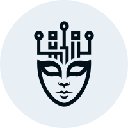-
 Bitcoin
Bitcoin $85,080.8459
0.81% -
 Ethereum
Ethereum $1,584.2731
0.38% -
 Tether USDt
Tether USDt $1.0001
0.02% -
 XRP
XRP $2.0724
-1.00% -
 BNB
BNB $591.2144
1.27% -
 Solana
Solana $134.8640
2.25% -
 USDC
USDC $0.9999
0.01% -
 TRON
TRON $0.2484
-0.21% -
 Dogecoin
Dogecoin $0.1570
1.20% -
 Cardano
Cardano $0.6224
1.64% -
 UNUS SED LEO
UNUS SED LEO $9.0878
-3.43% -
 Chainlink
Chainlink $12.5877
2.26% -
 Avalanche
Avalanche $19.1396
1.59% -
 Stellar
Stellar $0.2411
2.00% -
 Toncoin
Toncoin $2.9598
2.64% -
 Shiba Inu
Shiba Inu $0.0...01184
0.22% -
 Hedera
Hedera $0.1645
4.22% -
 Sui
Sui $2.1344
3.36% -
 Bitcoin Cash
Bitcoin Cash $338.5173
5.58% -
 Polkadot
Polkadot $3.6412
2.01% -
 Litecoin
Litecoin $75.5757
1.18% -
 Hyperliquid
Hyperliquid $16.8228
6.01% -
 Dai
Dai $1.0001
0.01% -
 Bitget Token
Bitget Token $4.3723
1.35% -
 Ethena USDe
Ethena USDe $0.9992
0.00% -
 Pi
Pi $0.6123
0.80% -
 Monero
Monero $217.6581
0.00% -
 Uniswap
Uniswap $5.2045
0.83% -
 Pepe
Pepe $0.0...07326
1.98% -
 OKB
OKB $50.6209
-1.48%
How does NFT Gaming change the traditional gaming economy?
NFT gaming disrupts traditional gaming by introducing player-owned, tradable in-game assets via blockchain, creating new revenue streams through play-to-earn models and vibrant secondary markets, but also introducing risks like market volatility and scams.
Mar 01, 2025 at 08:48 pm
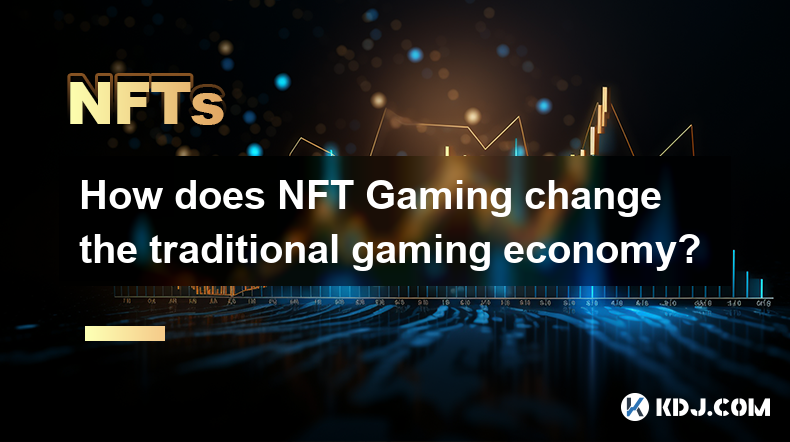
Key Points:
- NFTs introduce ownership and scarcity to in-game assets, altering the traditional model of renting access.
- Play-to-earn (P2E) mechanics create new revenue streams for players, blurring lines between gaming and work.
- NFT marketplaces foster a secondary market for in-game items, generating value beyond the game itself.
- Blockchain technology enhances transparency and security in asset management and transactions.
- Interoperability between games is facilitated, allowing asset transfer across different platforms.
- The shift impacts game developers, publishers, and players, requiring adaptation and new strategies.
How Does NFT Gaming Change the Traditional Gaming Economy?
Traditional gaming economies primarily revolve around the sale of games and in-game purchases. Players typically rent access to game worlds and their assets. Ownership is illusory; the game developer or publisher controls all assets. NFT gaming disrupts this paradigm by introducing true ownership via non-fungible tokens. This fundamentally alters the player-developer relationship and reshapes economic incentives.
The introduction of NFTs transforms in-game items into unique, verifiable digital assets. These assets are not merely cosmetic enhancements; they represent genuine ownership, provable on a public blockchain. This ownership allows players to buy, sell, and trade these assets on NFT marketplaces, creating a vibrant secondary market that extends beyond the game's lifespan.
Play-to-earn (P2E) mechanics are a core element of many NFT games. Unlike traditional games where progress is primarily for personal enjoyment, P2E games allow players to earn cryptocurrency or NFTs by playing. This generates a tangible financial incentive, blurring the lines between gaming and work, and attracting a new demographic of players motivated by financial gain.
Blockchain technology provides the underlying infrastructure for NFT gaming. This offers several advantages over traditional gaming systems. The transparency of the blockchain ensures that all transactions are publicly auditable, reducing the risk of fraud and manipulation. Furthermore, the immutable nature of blockchain data guarantees the authenticity and ownership of NFTs.
Interoperability is another significant change brought about by NFT gaming. In traditional gaming, assets are typically confined to a single game. NFT gaming, however, aims for cross-game compatibility, allowing players to transfer their assets between different games. This creates a more interconnected and fluid gaming ecosystem. Imagine using your prized sword from one game in another, seamlessly integrating your progress and assets.
The shift to NFT gaming presents both opportunities and challenges for game developers and publishers. Developing and maintaining NFT games requires a different skill set and infrastructure compared to traditional game development. They need to navigate the complexities of blockchain technology, NFT marketplaces, and the regulatory landscape surrounding cryptocurrencies. Furthermore, the economics of NFT games often require careful design to avoid creating unsustainable or exploitative systems.
How are players affected by the shift to NFT gaming?
Players now have true ownership of in-game assets, enabling them to participate in a secondary market. This creates new revenue streams, but also introduces risks associated with market volatility and potential scams. Players must understand the risks and rewards before investing time and resources in NFT games.
The introduction of P2E mechanics alters the player experience. While offering financial incentives, it can also lead to a focus on profit maximization rather than pure enjoyment. The balance between fun and financial gain is a crucial aspect of successful P2E games. Furthermore, some games have been criticized for their potentially exploitative mechanics.
How does NFT gaming affect the overall gaming industry?
The integration of NFTs is transforming the gaming industry's economic model, moving from a primarily centralized system to a more decentralized one. This impacts game development, marketing, and community building, requiring adaptations across the board.
Frequently Asked Questions:
Q: What are the risks associated with NFT gaming?
A: The cryptocurrency market is inherently volatile. The value of in-game NFTs can fluctuate significantly, leading to potential losses for players. Scams and fraudulent projects are also prevalent in the NFT space. Players should exercise caution and thoroughly research any game or NFT before investing.
Q: Is NFT gaming sustainable in the long term?
A: The long-term sustainability of NFT gaming depends on several factors, including the continued growth of the cryptocurrency market, the development of more engaging and sustainable game economies, and the adoption of regulatory frameworks. The current landscape is still evolving, and it remains uncertain whether the current models will prove sustainable in the long run.
Q: How do I get started with NFT gaming?
A: To begin, research different NFT games. Understand the game's mechanics, the value of its in-game assets, and the potential risks involved. You will need a cryptocurrency wallet to store your NFTs and interact with the game's blockchain. Research and choose a reputable wallet. You will also need to acquire cryptocurrency to purchase in-game NFTs. Remember to always practice safe crypto handling practices.
Q: What is the difference between traditional gaming and NFT gaming?
A: Traditional gaming operates on a rental model; players don't truly own in-game assets. NFT gaming uses blockchain technology to give players verifiable ownership of digital assets, enabling trading and creating a secondary market.
Q: Are all NFT games play-to-earn?
A: No, while many NFT games incorporate play-to-earn mechanics, not all do. Some NFT games focus on the ownership and trading of digital assets without direct financial incentives for gameplay.
Q: What are the ethical considerations of NFT gaming?
A: Ethical concerns include the potential for exploitative gameplay loops, environmental impact due to energy consumption of certain blockchains, and the risk of scams and fraudulent projects targeting players. Responsible game design and regulation are crucial to mitigate these risks.
Disclaimer:info@kdj.com
The information provided is not trading advice. kdj.com does not assume any responsibility for any investments made based on the information provided in this article. Cryptocurrencies are highly volatile and it is highly recommended that you invest with caution after thorough research!
If you believe that the content used on this website infringes your copyright, please contact us immediately (info@kdj.com) and we will delete it promptly.
- The XRP chart is becoming active again. Some analysts believe the price is near a key point.
- 2025-04-18 05:15:12
- Bitcoin (BTC) Price Rebounds Toward $85,000 as Buying Interest Slowly Increases
- 2025-04-18 05:15:12
- Coinbase Upgrades Its Solana Infrastructure to Improve Transaction Speeds
- 2025-04-18 05:10:12
- Coldware (COLD) Presale Success Stuns Bonk (BONK) and Pepe Coin (PEPE) as New Contender Emerges
- 2025-04-18 05:10:12
- 4 Cryptos Under $150 with the Potential to Deliver Huge Returns in 2025
- 2025-04-18 05:05:12
- Speculation is swirling in the crypto markets as rumors of a Solana ETF continue to build momentum
- 2025-04-18 05:05:12
Related knowledge
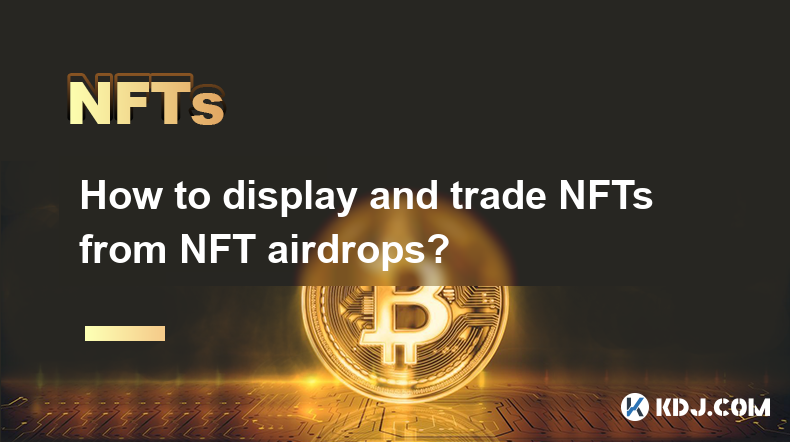
How to display and trade NFTs from NFT airdrops?
Apr 18,2025 at 04:42am
How to Display and Trade NFTs from NFT Airdrops? NFT airdrops have become a popular way for projects to distribute their tokens and engage with their community. If you've received NFTs through an airdrop, you might be wondering how to display and trade them. This article will guide you through the process step-by-step, ensuring you can showcase your NFT...
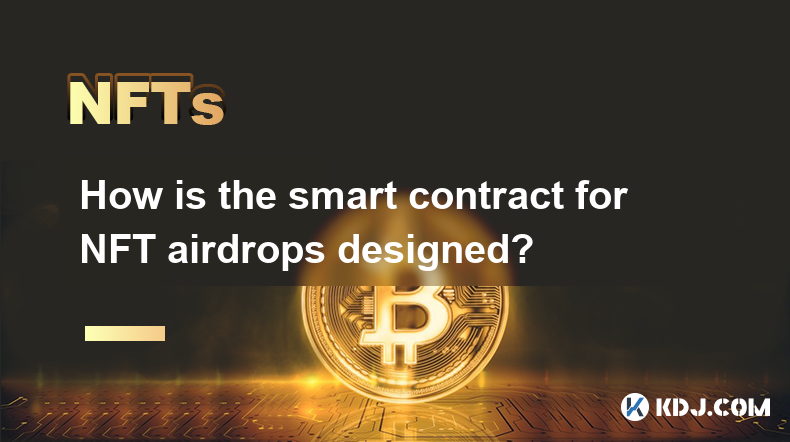
How is the smart contract for NFT airdrops designed?
Apr 18,2025 at 03:10am
The design of a smart contract for NFT airdrops is a complex process that requires careful consideration of various factors to ensure the airdrop is executed smoothly and securely. This article will delve into the intricacies of how such a smart contract is designed, focusing on key components, security measures, and the implementation process. Key Comp...
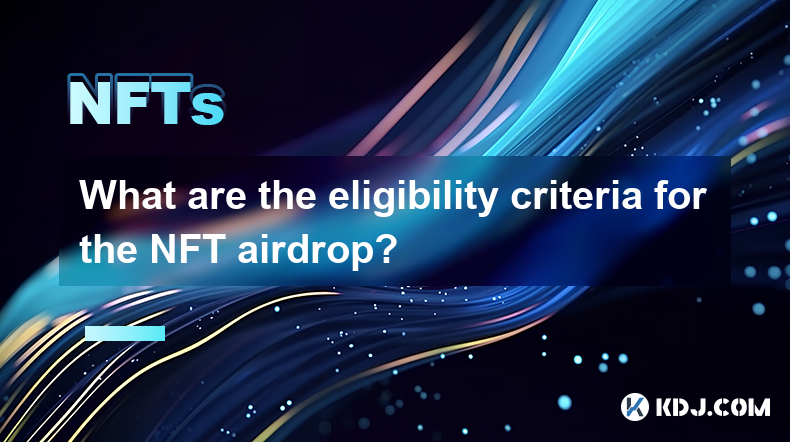
What are the eligibility criteria for the NFT airdrop?
Apr 17,2025 at 04:56pm
Understanding NFT AirdropsNFT airdrops are a popular method used by blockchain projects to distribute non-fungible tokens (NFTs) to their community members. These airdrops can serve various purposes, such as rewarding loyal users, promoting new projects, or increasing the visibility of existing ones. To participate in an NFT airdrop, individuals must me...
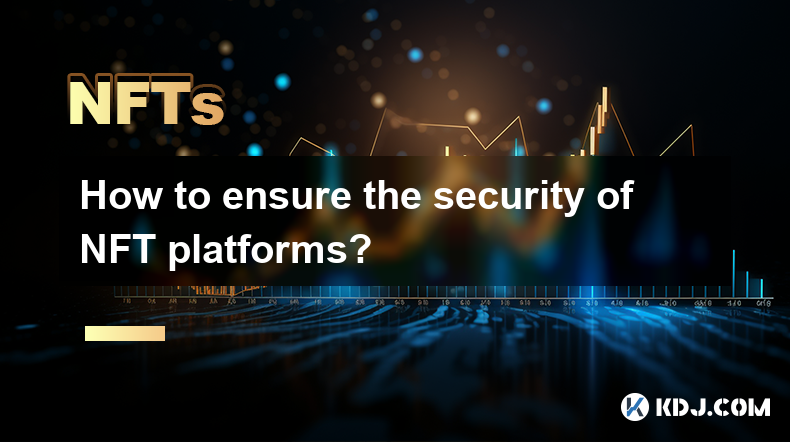
How to ensure the security of NFT platforms?
Apr 18,2025 at 04:22am
Ensuring the security of NFT platforms is crucial in the rapidly evolving world of cryptocurrency and digital assets. With the rise of non-fungible tokens (NFTs), it's essential to implement robust security measures to protect both the platform and its users. This article will delve into various strategies and best practices to safeguard NFT platforms a...

What core technologies are needed to develop an NFT platform?
Apr 18,2025 at 02:29am
Developing an NFT (Non-Fungible Token) platform requires a deep understanding of several core technologies. These technologies span various domains including blockchain, smart contracts, and user interface design. Here, we will explore the essential technologies needed to build a robust and user-friendly NFT platform. Blockchain TechnologyBlockchain is ...
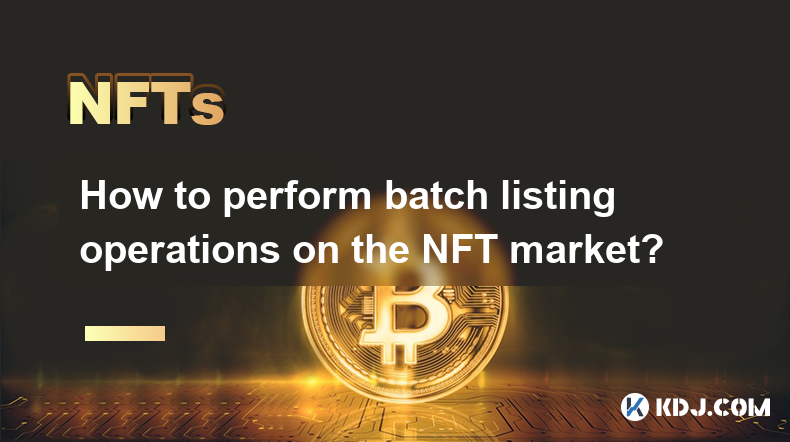
How to perform batch listing operations on the NFT market?
Apr 18,2025 at 04:00am
Introduction to Batch Listing on NFT MarketplacesBatch listing on NFT marketplaces allows creators and sellers to efficiently list multiple NFTs at once, saving time and effort. This process can be particularly useful for artists or collectors who have a large number of NFTs to list. By understanding how to perform batch listing, users can streamline th...

How to display and trade NFTs from NFT airdrops?
Apr 18,2025 at 04:42am
How to Display and Trade NFTs from NFT Airdrops? NFT airdrops have become a popular way for projects to distribute their tokens and engage with their community. If you've received NFTs through an airdrop, you might be wondering how to display and trade them. This article will guide you through the process step-by-step, ensuring you can showcase your NFT...

How is the smart contract for NFT airdrops designed?
Apr 18,2025 at 03:10am
The design of a smart contract for NFT airdrops is a complex process that requires careful consideration of various factors to ensure the airdrop is executed smoothly and securely. This article will delve into the intricacies of how such a smart contract is designed, focusing on key components, security measures, and the implementation process. Key Comp...

What are the eligibility criteria for the NFT airdrop?
Apr 17,2025 at 04:56pm
Understanding NFT AirdropsNFT airdrops are a popular method used by blockchain projects to distribute non-fungible tokens (NFTs) to their community members. These airdrops can serve various purposes, such as rewarding loyal users, promoting new projects, or increasing the visibility of existing ones. To participate in an NFT airdrop, individuals must me...

How to ensure the security of NFT platforms?
Apr 18,2025 at 04:22am
Ensuring the security of NFT platforms is crucial in the rapidly evolving world of cryptocurrency and digital assets. With the rise of non-fungible tokens (NFTs), it's essential to implement robust security measures to protect both the platform and its users. This article will delve into various strategies and best practices to safeguard NFT platforms a...

What core technologies are needed to develop an NFT platform?
Apr 18,2025 at 02:29am
Developing an NFT (Non-Fungible Token) platform requires a deep understanding of several core technologies. These technologies span various domains including blockchain, smart contracts, and user interface design. Here, we will explore the essential technologies needed to build a robust and user-friendly NFT platform. Blockchain TechnologyBlockchain is ...

How to perform batch listing operations on the NFT market?
Apr 18,2025 at 04:00am
Introduction to Batch Listing on NFT MarketplacesBatch listing on NFT marketplaces allows creators and sellers to efficiently list multiple NFTs at once, saving time and effort. This process can be particularly useful for artists or collectors who have a large number of NFTs to list. By understanding how to perform batch listing, users can streamline th...
See all articles





















































































